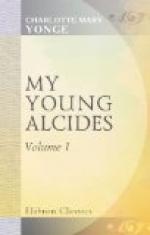>From that time I believe there never was a day that he did not come to my sitting-room to gaze at little Percy. He chose the time when I was least likely to be there, and I knew it well enough to take care that the coast should be left clear for him. I do believe that, ill-taught and unheeding as the poor dear fellow had been, that service was the first thing that had borne in upon him any sense that his children were actually existing, and in joy and bliss; and that when he had once thus hearkened to the idea, that load of anguish, which made him wince at the least recollection of them, was taken off. It was not his nature to speak in the freshness of emotion, and, after a time, there was a seal upon his feelings; but there was an intermediate period when he sometimes came for sympathy, but that was so new a thing to him that he did not quite know how to seek it.
It was the next Sunday evening that I came into my room at a time I did not expect him to be there, just as it was getting dark, that he seemed to feel some explanation due. “This picture,” he said, “it is so like my poor little chap.”
Then he asked me how old Percy had been when it was taken; and then I found myself listening, as he leant against the mantelpiece, to a minute description of poor little Ambrose, all the words he could say, his baby plays, and his ways of welcoming and clinging to his father, even to the very last, when he moaned if anyone tried to take him out of Harold’s arms. It seemed as though the dark shadow and the keen sting had somehow been taken away by the assurance that the child might be thought of full of enjoyment; and certainly, from that time, the peculiar sadness of Harold’s countenance diminished. It was always grave, but the air of oppression went away.
I said something about meeting the child again, to which Harold replied, “You will, may be.”
“And you, Harold.” And as he shook his head, and said something about good people, I added, “It would break my heart to think you would not.”
That made him half smile in his strange, sad way, and say, “Thank you, Lucy;” then add, “But it’s no use thinking about it; I’m not that sort.”
“But you are, but you are, Harold!” I remember crying out with tears. “God has made you to be nobler, and greater, and better than any of us, if you only would—”
“Too late,” he said. “After all I have been, and all I have done—”
“Too late! Harry—with a whole lifetime before you to do God real, strong service in?”
“It won’t ever cancel that—”




